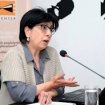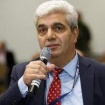Russia and the Karabakh Conflict – 2018
The online conference was held on the Public Dialogues website (www.publicdialogues.info). It was organized within the framework of the “Public Dialogues for Communication between Armenian and Azerbaijani Specialists” project, implemented by Region Research Center. The project is supported by the Black Sea Trust for Regional Cooperation, German Marshall Fund. The project partner is the Institute for Peace and Democracy (the Netherlands). "Public Dialogues" website was created in 2012 by Region Research Center and the Institute for Peace and Democracy.
Participants
Alexander Podrabinek (Russia) - Journalist, human rights activist.
Vadim Mukhanov (Russia) – PhD in history studies, leading researcher at the Center for Post-Soviet Studies, IMEMO, RAS,
Stepan Grigoryan (Armenia) – Director of the Analytical Center on Globalization and Regional Cooperation,
Emin Akhmedbekov (France ) - Political commentator, Turan TV,
Laura Baghdasaryan (Armenia) - Director of Region Research Center, acted as the moderator of the conference.
What issues and aspects were discussed?
- The main priorities of Russia in relations with Armenia and Azerbaijan at the moment,
- The impact of these priorities on the Karabakh conflict in the foreseeable future,
- The interest in external conflicts held by authoritarian regimes to strengthen their power,
- The role of democracies in conflict resolution,
- Russia's reaction to internal processes in Armenia and the fight against corruption, the filed criminal charges against certain figures,
- The results of Aliyev's working visit to Russia on September 1, and the forthcoming meeting between N. Pashinyan and V. Putin on September 8,
- Wars of memory and the issue of changing elites and generations,
- The perception of Russia's policy over the Karabakh conflict in Russia, and the dynamics of Russia's perception in Armenia and Azerbaijan within the same Karabakh context,
- The capacities of the parties to the conflict, mediators for the outcome of the conflict (military or political),
- CSTO in the context of the Karabakh conflict and an evaluation of the campaign launched in the Azerbaijani media about the potential integration of Azerbaijan into this organization.
The online conference was held in Russian. Here we present some excerpts in Englisht. Read the full text of the online conference HERE.
Laura Baghdasaryan – The mediation mission of Russia has been there for as long as the Karabakh conflict itself. As at the very beginning of the Armenian-Azerbaijani confrontation (in 1988), today too - more than 30 years later, the parties to the conflict have closer connections with Russia, than the other two OSCE MG co-chairing countries. Today we can state that the historically objective connections Russia (Soviet Russia at the time) had with the conflict have got fragmented over years. This connection and Russia's interest in the Karabakh conflict are shaped by economic and geopolitical interests, and even internal political issues in Armenia and Azerbaijan. On the other hand, Russia acts as one of the countries co-chairing the OSCE Minsk Group, formally demonstrating "equidistance" from the parties to the conflict.
It is interesting that the relations with Armenia and Azerbaijan in Russia, and reversely, the perception of Russia as a partner country in Armenia and Azerbaijan were







 +37410 563363
+37410 563363
 1/3 Buzand Str, 8 Floor, Yerevan, Armenia
1/3 Buzand Str, 8 Floor, Yerevan, Armenia